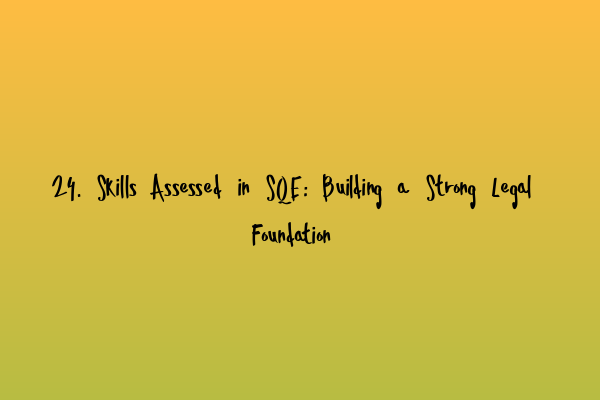Building a Strong Legal Foundation: Skills Assessed in SQE
As aspiring solicitors, preparing for the Solicitors Qualifying Examination (SQE) can be both exciting and daunting. The SQE is a comprehensive assessment of your knowledge and skills, designed to ensure that you are ready to enter the legal profession. One of the key aspects of the SQE is evaluating your ability to build a strong legal foundation. In this article, we will explore the skills assessed in the SQE and provide tips on how to excel in this crucial area.
1. Legal Research and Analysis
Legal research and analysis are fundamental skills for any solicitor. The SQE evaluates your ability to identify and interpret legal sources, such as statutes, case law, and legal precedents. Moreover, it tests your skill in applying these sources to specific legal issues and providing well-reasoned arguments. To excel in this area, it is important to develop strong research skills, stay updated with legal developments, and practice analyzing and applying legal principles. Mastering Time Management in SQE: Strategies for Efficient Exam Completion offers valuable insights into managing your time effectively during the exam.
2. Problem-Solving and Critical Thinking
Solving legal problems requires strong analytical and critical thinking skills. The SQE assesses your ability to identify, analyze, and propose solutions to complex legal scenarios. To enhance your problem-solving skills, it is crucial to practice scenario-based questions, such as those found in Scenario-Based Questions SQE2: Enhance Your Problem-Solving Skills. These questions simulate real-life legal scenarios and require you to apply legal knowledge to find practical solutions. Additionally, practicing past exam questions can help you build confidence and improve your critical thinking abilities.
3. Oral Communication and Advocacy
Effective oral communication and advocacy skills are essential for solicitors, particularly when presenting arguments in court or negotiating with clients. The SQE assesses your ability to communicate legal concepts clearly and persuasively. Developing these skills requires practice, including participating in mooting competitions or mock trials. These experiences can help you gain confidence in public speaking, improve your ability to articulate complex legal arguments, and enhance your overall communication skills.
4. Drafting and Writing Skills
Strong drafting and writing skills are crucial for solicitors, as they are often required to draft legal documents, contracts, and written arguments. The SQE assesses your ability to draft clear, concise, and well-structured legal documents. To improve your drafting and writing skills, it is essential to practice writing legal opinions, memoranda, and letters. Mastering Effective Revision Techniques for SQE Success provides helpful tips on refining your writing skills and efficient revision strategies.
5. Professional Ethics and Judgement
Professional ethics and judgement are key qualities for solicitors, as they play a vital role in maintaining the integrity of the legal profession. The SQE assesses your knowledge and understanding of legal ethics, including your ability to spot ethical issues and make appropriate decisions. To prepare for this aspect of the exam, it is important to familiarize yourself with the Solicitors Regulation Authority’s (SRA) Code of Conduct and Ethics. Additionally, engaging in discussions or ethics workshops can help you develop your ethical reasoning skills.
6. Client Care and Communication Skills
Solicitors are client-facing professionals, and excellent client care and communication skills are essential for success. The SQE evaluates your ability to understand clients’ needs, provide effective legal advice, and communicate complex legal concepts in a clear manner. Developing these skills requires actively listening to clients, empathizing with their concerns, and practice in mock client interviews. Conquer the Multiple Choice Questions (MCQ) in SQE1 discusses strategies for tackling multiple-choice questions, which can also be helpful in this area.
Conclusion
Building a strong legal foundation is crucial for success in the SQE and as a future solicitor. By focusing on developing and refining key skills such as legal research, problem-solving, oral communication, drafting, professional ethics, and client care, you can prepare yourself to excel in the SQE. Remember, practice is key! Utilize the related articles mentioned throughout this blog post to further enhance your skills and increase your chances of achieving success in the SQE.
